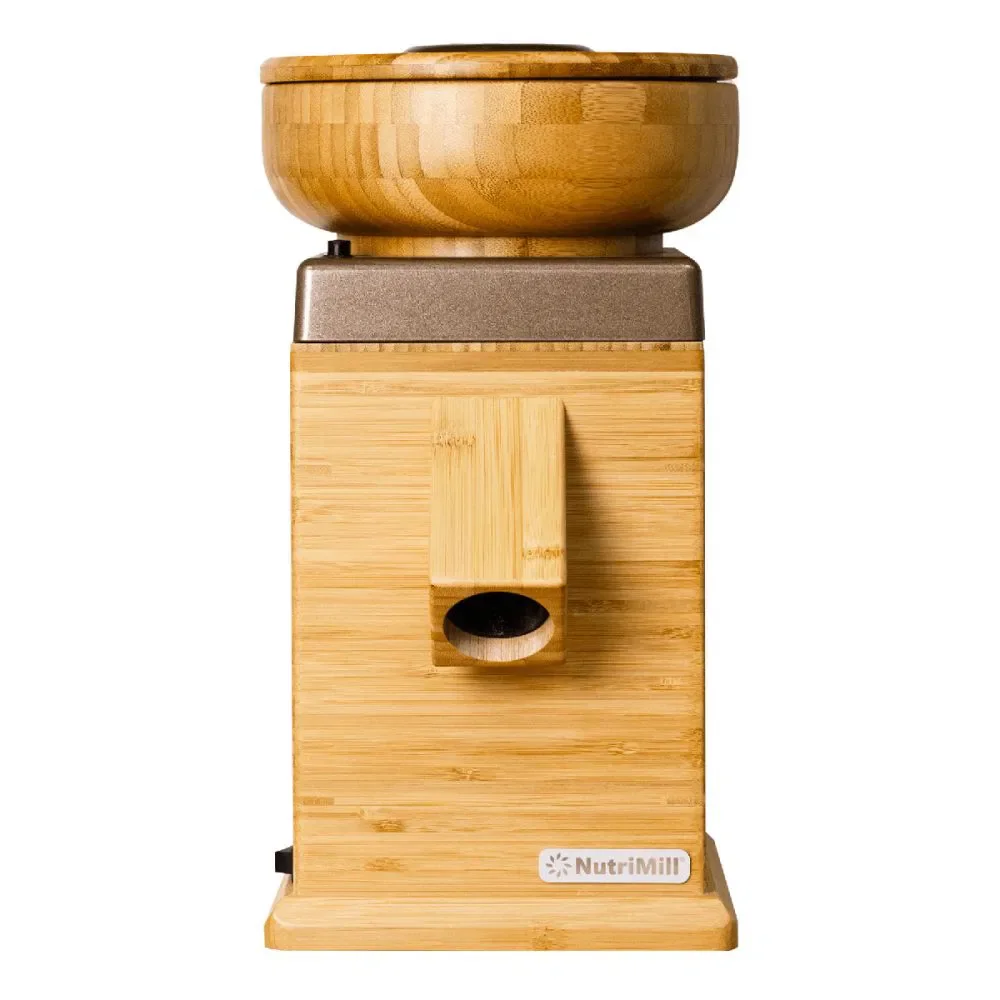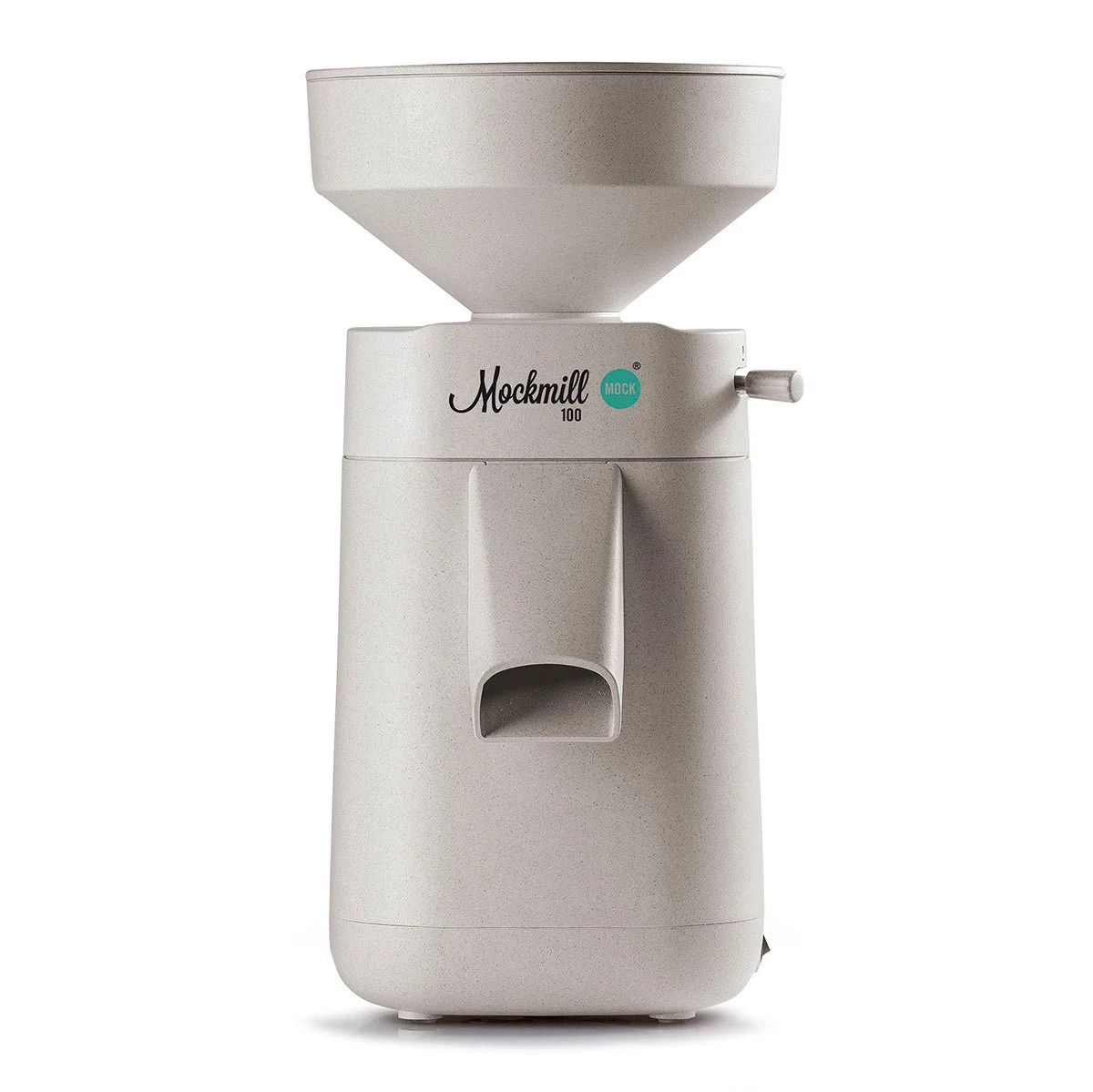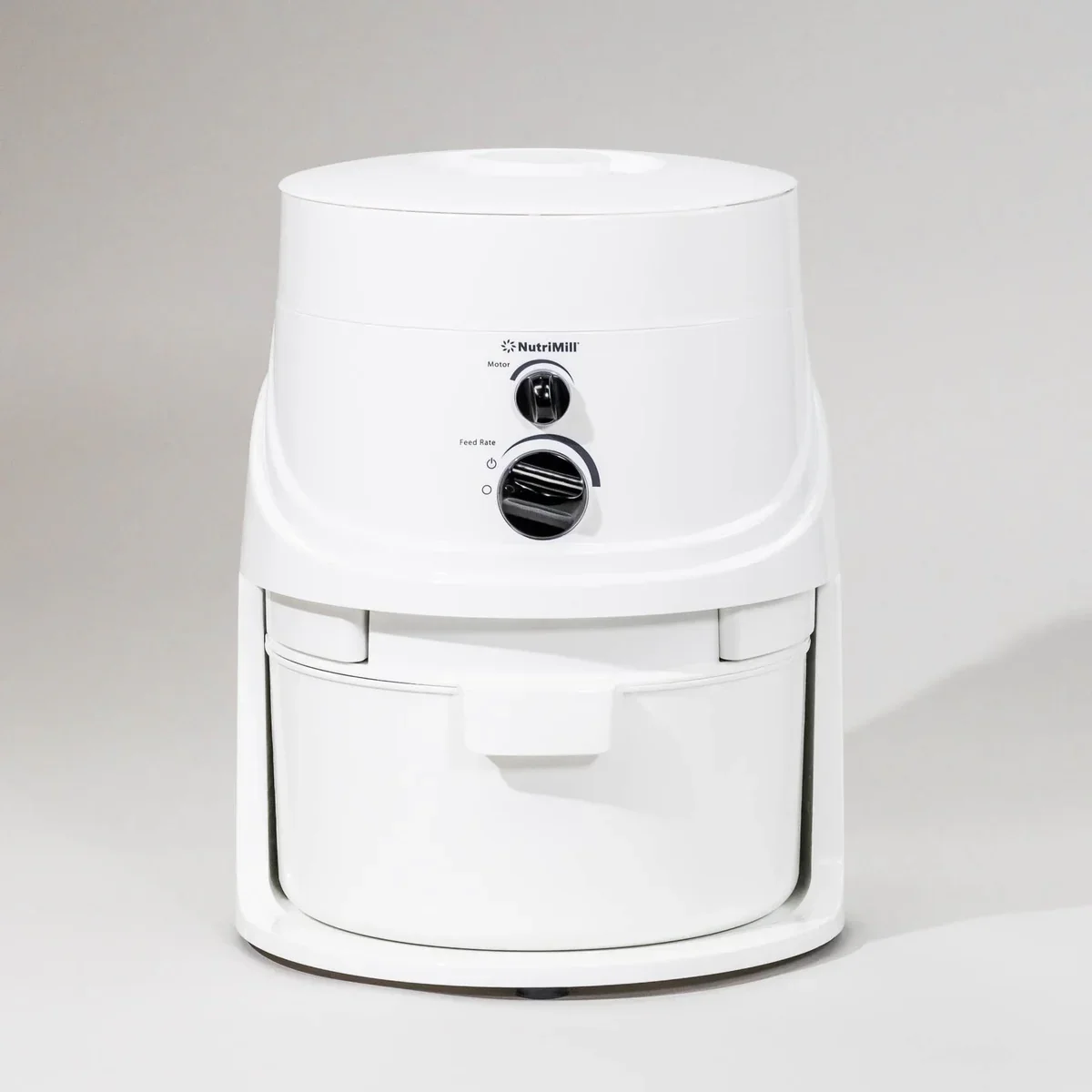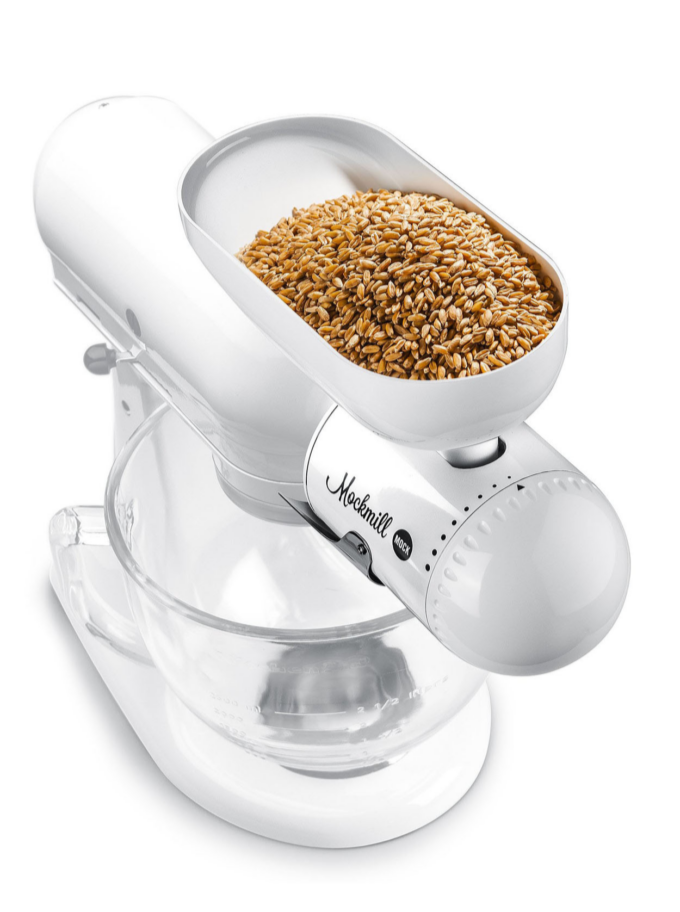Home Grain Mills Guide: Choosing the Best Mill for Baking With Heritage Grains
There’s nothing quite like baking with fresh-milled flour from your own kitchen. If you’ve ever tasted bread made from freshly milled heritage grains like Turkey Red, White Sonora, English Redhead™, or Amber Eden™, you already know the difference — richer flavor, fuller aroma, and far more nutrition than store-bought flour.
Home mills are booming among home bakers and homesteaders who want to grind their own heritage wheat, spelt, and barley. Below you’ll find today’s best options available in the U.S., organized by type, price, and performance. Note that we are able to provide coupon codes for certain models, so be sure to take advantage of that!
⚡ Electric Stone-Burr Mills
Cool grinding · Flavor preserving · Perfect for heritage grains
Stone-burr mills are the gold standard for milling heritage grains. They grind slowly and stay cool, preserving natural oils, flavor, and nutrients. Stone mills grind grain by feeding kernels between two circular millstones—one stationary and one rotating. As the stones turn, their grooved surfaces shear, crush, and rub the grain into flour through a gentle, low-heat friction process that preserves the germ oils and natural enzymes. Over time, the stones may wear slightly, which is why many traditional millers periodically “dress” (re-groove) them to keep the grind consistent.
✅ Pros:
Produces cool, flavorful, nutrient-rich flour
Handles heritage wheats, spelt, rye, and barley easily
Adjustable from cracked grain to fine pastry flour
Quiet, clean operation and long-lasting stone burrs
⚠️ Cons:
Slower than impact mills for large batches
Not suitable for oily or damp grains
Heavier and slightly pricier upfront
NutriMill Harvest
A modern bamboo-clad stone-burr mill for small households that still want true-stone performance.
Best for: Light to medium use
Price: ~$499
Buy: nutrimill.com →
Use promo code PALOUSEHERITAGE at checkout for $20 off!
💡 Pro Tip: For large kernels like emmer or spelt, start coarse on your first pass, then re-mill fine. This reduces strain and produces more consistent flour.
Mockmill 100 / 200 / Lino Series
German-made with precise stone burrs and intuitive design, Mockmills are a favorite for home bakers. They handle hard and soft wheats, barley, spelt, rye, and einkorn beautifully.
Best for: Everyday milling of heritage grains
Price: From $363 (Mockmill 100)
Buy: Pleasant Hill Grain - Mockmill →
Note, similar to KoMo mills, Mockmill mills are in high demand and are often out of stock. Check back regularly if the model you desire is currently unavailable.
KoMo Classic / Fidibus / Mio / XL
Austrian craftsmanship meets function. KoMo mills are quiet, durable, and beautiful — ideal for bakers who mill frequently and value long warranties (12 years).
Best for: Heritage wheats · spelt · rye · emmer
Price: $579 – $739 depending on model
Buy: Pleasant Hill Grain – KoMo Mills →
Note, Pleasant Hill Grain is the primary retailer for KoMo mills in the U.S. They are in high demand and are often out of stock. Check back regularly if the model you desire is currently unavailable.
🔌 Electric Impact Mills
High-speed · Fine texture · Best for large batches
Impact mills grind by high-speed micronization, producing ultra-fine flour in seconds. They’re great for sandwich loaves or pastries but not for oily or moist grains. They use high-speed stainless-steel blades or impellers that spin at tens of thousands of revolutions per minute. The grain is fed into a small chamber where it’s shattered on contact with these moving metal surfaces, producing an extremely fine, powdery flour almost instantly. This method is fast and efficient, though it tends to generate more heat and lacks the slow, textured grind of a traditional stone mill.
✅ Pros:
Extremely fast — ideal for big batches or fine bread flour
Lower upfront cost than most stone mills
Lightweight and simple to operate
⚠️ Cons:
Generates more heat, reducing some nutrition and flavor
Can’t handle oily or moist grains (flax, chia, etc.)
Produces only fine flour — no coarse/cracked settings
NutriMill Classic
Powerful and fast, ideal for families baking multiple loaves per week.
Best for: Fine white bread flour
Price: ~$299
Buy: nutrimill.com →
Use promo code PALOUSEHERITAGE at checkout for $20 off!
WonderMill
Similar performance to NutriMill with quick cleanup and large capacity.
Best for: Bulk milling of dry grains
Price: ~$329
⚠️ Avoid oily or moist grains (flax, chia, sesame) in impact mills — they can gum up the plates.
👐 Manual & Motorizable Mills
Heirloom durability · Off-grid ready · Cracked grain control
Manual mills give you complete control and independence. They’re perfect for small batches or backup power-free milling. Manual grain mills work through mechanical leverage—you turn a hand crank that rotates steel or stone burrs to crush and shear the grain into flour. The slower pace gives you full control over texture, from coarse cracked grain to fine flour, and keeps the process naturally cool. Many of these mills can later be motorized with a belt or small electric drive, combining the satisfaction of hand milling with the convenience of power when tackling larger batches.
✅ Pros:
Total control over grind texture (cracked to fine)
Works anywhere — no electricity needed
Built for decades of use; truly heirloom tools
Can be motorized later for convenience
⚠️ Cons:
Hand-cranking fine flour requires effort and time
Bulk milling can be tiring without a motor
Heavier units need a sturdy counter or mounting surface
Soft grains can clog manual steel mills, so it may be necessary to mix them with a harder grain when grinding
Country Living Grain Mill
U.S.-made cast-aluminum mill built for generations of use. Easily hand-cranked or motorized later.
Best for: Small batches · off-grid baking
Price: $765 (hand) / $1,250 (with motor kit)
Buy: countrylivinggrainmills.com →
Use promo code PALOUSEHERITAGE at checkout for $25 off!
GrainMaker Model 99
Montana-made from solid steel, this mill is designed for a lifetime of precise milling.
Best for: Coarse to fine control with hand power
Price: ~$843
Stand-Mixer Attachment
If you already own a KitchenAid, a mill attachment could be a good place to start before investing in a higher-end dedicated mill. Grain-mill attachments (like the Mockmill KitchenAid Attachment) connect directly to a stand mixer’s power hub, using the mixer’s motor to turn compact milling burrs. Most quality attachments, including Mockmill’s, use real stone burrs for cool, slow grinding similar to full-sized mills. Others, such as the KitchenAid metal grain-mill attachment, use steel burrs that crush and shear grain at higher speed for a fine, clean flour.
✅ Pros:
Affordable entry into true stone milling
Compact — takes up little extra space
Great for occasional bakers or testing different grains
⚠️ Cons:
Slower and less powerful than dedicated mills
Can strain smaller stand-mixer motors on large batches
Smaller capacity; not ideal for daily bulk milling
KitchenAid Grain Mill Attachment
If you already own a KitchenAid stand mixer, the KGM Grain Mill Attachment offers a compact, value-friendly entry into home milling. This all-metal unit attaches to your mixer’s power hub and allows you to grind low-moisture, low-oil grains (wheat, oats, rice, corn, barley, millet) in multiple texture settings. Amazon
Best for: Casual bakers who want to mill in small batches without buying a dedicated mill
Price: Typically under ~$250
Mockmill Stand-Mixer Attachment
Real stone burrs that fit directly onto your stand mixer — a great starter option for small-batch milling.
Price: ~$250
Quick Comparison Table
| Mill | Type | Approx Price | Strengths | Best for Heritage Grains |
|---|---|---|---|---|
| Mockmill 100 / 200 | Electric stone burr | $363 – $739 | Cool grind, consistent flour | ⭐⭐⭐⭐⭐ Excellent |
| KoMo Classic / XL | Electric stone burr | $579 – $739 | Durable · quiet · beautiful | ⭐⭐⭐⭐⭐ Excellent |
| NutriMill Classic | Electric impact | $299 | Fast, fine flour | ⭐⭐⭐ Good |
| WonderMill | Electric impact | $329 | High capacity · reliable | ⭐⭐⭐ Good |
| Country Living Mill | Manual / motor kit | $765 – $1,250 | Heirloom durability | ⭐⭐⭐⭐ Very Good |
| GrainMaker Model 99 | Manual steel burr | $843 | All-steel construction, ultra-clean grind | ⭐⭐⭐⭐ Very Good |
| Mockmill Stand-Mixer Attachment | Stand-mixer stone burr | $250 | Compact · true stone milling | ⭐⭐⭐ Good starter |
| KitchenAid Grain Mill Attachment (KGM) | Stand-mixer steel burr | $150 – $200 | Clean steel grind · uses existing mixer | ⭐⭐⭐ Good for light use |
💡 Tips for Home Millers
Start coarse then fine — especially with hard heritage wheats.
Cool between passes to preserve enzymes and flavor.
Clean burrs regularly using a cup of rice or soft brush.
Avoid oily seeds like flax or chia in stone/impact mills.
Match mill to usage — Mockmill for weekly loaves, KoMo XL for daily baking, Country Living for off-grid or heirloom use.
🌾 Our Take at Palouse Heritage
We’ve milled many batches of our heritage wheats and barleys — Turkey Red, White Sonora, Elwha River Spelt, Scots Bere, and more — through many different types of mills. Time and again, stone-burr models like Mockmill and KoMo deliver the finest texture, fullest aroma, and most flavorful flour for heritage grains. Their slow, cool grinding action helps preserve the natural oils and enzymes that give these grains their depth of character.
That said, steel-burr mills also have important advantages. They’re exceptionally durable, easier to clean, and ideal when switching between grain types. Some bakers prefer steel precisely because it avoids the tiny mineral residuals that can occasionally be released from composite or ceramic stone burrs over time. Though harmless and generally rare, this micro-grit is something a few millers notice early in a stone mill’s life before the burrs fully season.
In practice, both styles have their place. Stone mills yield that classic, cool, flavor-rich flour that’s steeped in milling tradition, while steel mills offer modern precision, cleanliness, and consistency. Either way, pairing the right mill with truly exceptional grain deepens your connection to the soil, the harvest, and the heritage craftsmanship we’re proud to preserve.
🛒 Where to Buy
KoMo Mills at Pleasant Hill Grain →
Country Living Grain Mills →
NutriMill →
WonderMill →
💨 What About Unifine Milling?
If you’ve ever seen “Unifine-milled flour” on a bag, that’s not a home mill — it’s a special high-speed impact process first developed right here in the Palouse at Washington State Univeristy. Unifine mills pulverize whole kernels into silky fine flour in a single pass, producing a remarkably light, whole-grain flour that retains 100% of the grain’s nutrients and flavor.
While Unifine systems are commercial-scale, the principle behind them — milling grains freshly and completely — is exactly what home millers are rediscovering today. Every time you grind your own heritage grain, you’re part of that same movement toward freshness, integrity, and flavor.
✨ Final Thought
Fresh-milling isn’t just about flour — it’s about reviving old grains and old ways. Every batch connects us to the land and to generations of farmers who grew these wheats before us.
📧 Have a favorite milling story or recipe?
Share it with us at info@palouseheritage.com — we’d love to feature it on our site.
This post may contain affiliate links. If you purchase through these links, we may earn a small commission at no extra cost to you. We only recommend products we use and trust.









